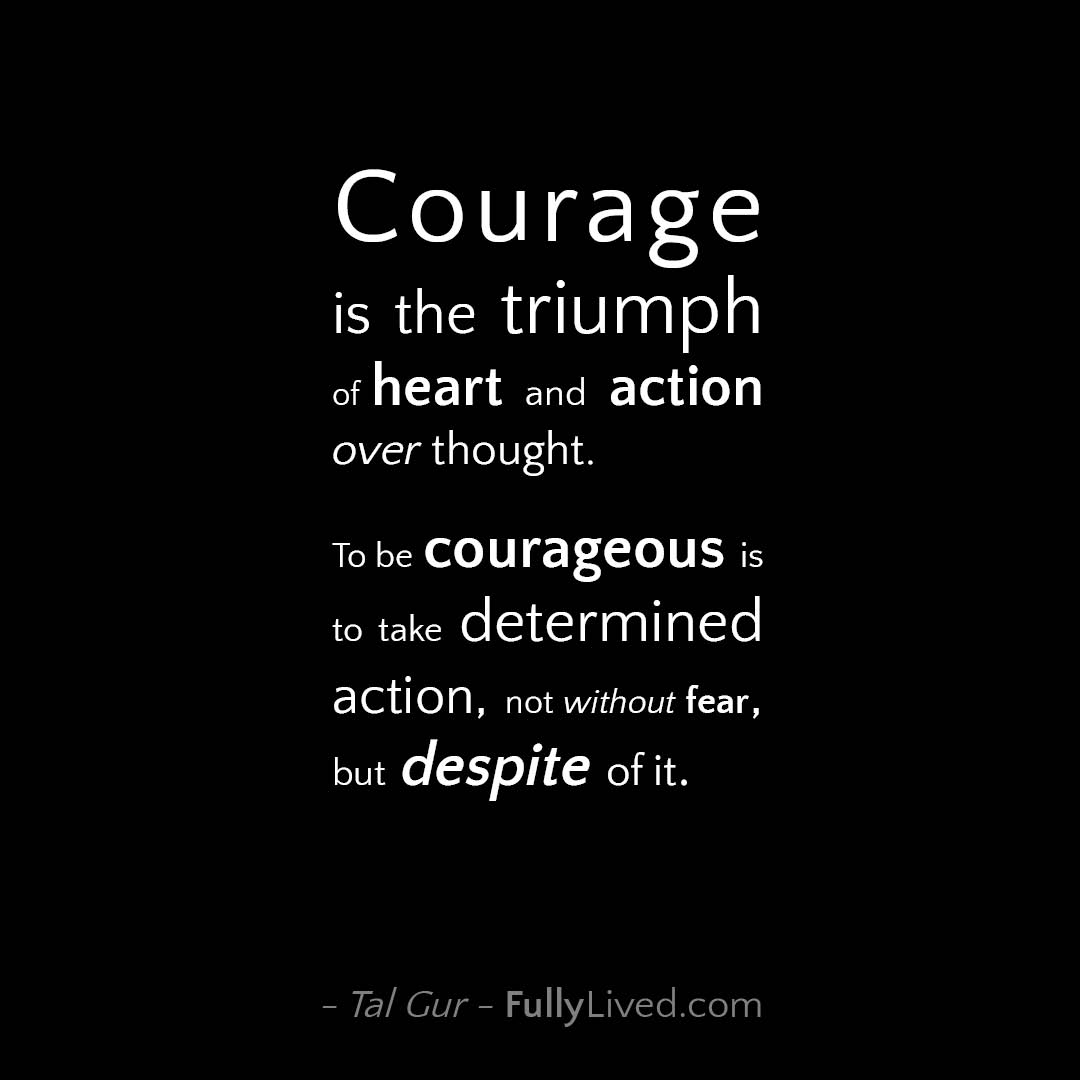Courage is the triumph of heart and action over thought. To be courageous is to take determined action, not without fear, but despite of it.
This saying encapsulates the essence of courage as a fusion of emotion, action, and determination that enables us to confront our fears and proceed in spite of them.
The phrase suggests that courage involves more than mere intellectual understanding or contemplation. It requires heart — emotional engagement and passion — and action. This statement implies that courage involves moving beyond overthinking or worry, and instead, acting from a place of conviction and determination.
The second sentence, "To be courageous is to take determined action, not without fear, but despite of it," emphasizes that courage doesn't denote the absence of fear. Instead, courage involves recognizing fear, yet choosing to act anyway. It acknowledges fear as a natural response but not a deterrent from action.
This quote, in essence, positions courage as a dynamic, action-oriented virtue that embodies emotional strength and determination. It suggests that the courageous aren't fearless, but are those who face their fears and move forward regardless, driven by conviction and the will to act.
Is there a historical example that illustrates the message of the quote?
The life and actions of Mahatma Gandhi, the leader of the Indian independence movement, exemplify the message of the quote, "Courage is the triumph of heart and action over thought. To be courageous is to take determined action, not without fear, but despite it."
Gandhi's relentless pursuit of India's freedom from British colonial rule showcased his unwavering courage and determination. Throughout his life, he faced numerous challenges, including imprisonment, violence, and resistance from both the British government and some segments of Indian society.
Despite the risks and personal sacrifices involved, Gandhi fearlessly led nonviolent civil disobedience movements and inspired millions of people to join the struggle for independence. His courage stemmed not from a lack of fear, but from his deep conviction in the power of love, truth, and nonviolence as instruments of change.
Gandhi believed that courage was not simply the absence of fear but the ability to act in the face of fear. He encouraged individuals to overcome their internal doubts and fears and to take decisive action in pursuit of justice, equality, and freedom.
Throughout his leadership, Gandhi demonstrated his belief in the power of peaceful resistance, even in the face of violence and oppression. He led protests, boycotts, and hunger strikes, always advocating for nonviolence and unity among the Indian people.
Gandhi's courage inspired millions and demonstrated that the triumph of heart and action over fear and doubt could bring about profound change. His unwavering commitment to nonviolence and his willingness to suffer personal hardships for the greater good inspired people around the world and paved the way for India's eventual independence.
The message of the quote is embodied in Gandhi's life and actions. He showed that courage is not the absence of fear but the ability to channel one's convictions and take determined action despite fear. He proved that ordinary individuals, driven by a deep sense of purpose and justice, can rise above their own doubts and fears and create extraordinary change in the world.
Gandhi's legacy serves as a reminder that courage is not reserved for a select few but is accessible to all. By embracing our values, acting with integrity, and remaining steadfast in the face of adversity, we too can demonstrate the triumph of heart and action over fear and make a positive impact in our own lives and the world around us.
* If you're looking for more inspiration to help you on your personal development journey, you may want to check out my extensive list of SMART goals. This page is packed with thousands of different goal ideas that can help you set new aspirations and reach higher heights in your life. Personally, this page helped me to create my own 100 life goals list, which I pursued for over a decade.
Chief Editor
 Tal Gur is an author, founder, and impact-driven entrepreneur at heart. After trading his daily grind for a life of his own daring design, he spent a decade pursuing 100 major life goals around the globe. His journey and most recent book, The Art of Fully Living, has led him to found Elevate Society.
Tal Gur is an author, founder, and impact-driven entrepreneur at heart. After trading his daily grind for a life of his own daring design, he spent a decade pursuing 100 major life goals around the globe. His journey and most recent book, The Art of Fully Living, has led him to found Elevate Society.





















